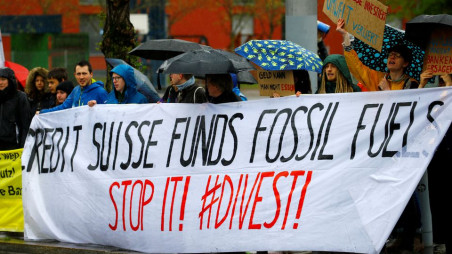When giant banks aggressively promote fossil fuels
Since the historic Paris Climate Conference in 2015, the top 60 global commercial and investment banks have financed USD 3.8 trillion in fossil fuels, including power plants, fuel extraction, and others, using both debt and equity instruments.

As we make the transition to clean energy, aiming to reach the level of net-zero emission by 2050, we need to ensure that the financial sector is on board and the banks have set their policies to align with the global greenhouse gas (GHG) mitigation target.
In fact, attaining the net-zero emission target significantly hinges on the carbon intensiveness/environment-friendliness of the portfolios of different banks. If the global climate goal diverges considerably from those of the world's giant banks, the likely scenario is widespread dissatisfaction in the end.
The recent publication "Banking on Climate Chaos" reveals to what extent global giant banks are funneling finance into fossil fuels disregarding our race to arrest climate change.
Much to the surprise of many people and one of the realities of the global banking systems that worries us deeply is that the biggest banks in the world are channeling finance into fossil fuels aggressively. According to the report, since the historic Paris Climate Conference in 2015, the top 60 global commercial and investment banks have financed USD 3.8 trillion in fossil fuels, including power plants, fuel extraction, and others, using both debt and equity instruments.
Moreover, contrary to the trend of oil market slump, reduction in overall energy usage and positive market growth of renewable energies, the total fossil fuel financing portfolio of the said 60 banks stood at a whopping USD 751 billion in 2020, only 8.86% and 3.84% less than 2019 and 2018 respectively. Ominously, the aggregate portfolio of the top 60 banks in 2020, based on fossil fuels, was 5.9% higher than that of 2016.
17 out of the 60 banks, considered in the study, have already vowed for net-zero emission. Nevertheless, the ratings of fossil fuel financing policies of these banks provided in the study are nothing short of disappointing.
Simply put, the fossil fuel financing policies these banks are currently pursuing will not take us anywhere near to the net-zero emission goal. Regrettably, some of these 60 banks have received 0 (zero) scores on coal policies as rein in coal financing is not on their agenda.
Despite the growing consensus on the urgency to save nature, increasing pressure from the school-goers, led by Greta Thunberg through climate strikes, and the opportunity to capitalise on the emission reduction in 2020, the business-as-usual pathway taken by the banks could limit us in realising the Paris climate goals on mitigation.
The call for building back a better and cleaner practice from different experts, activists, and policymakers appears to fall on deaf ears. The dangerous fallout of this could be the additional aggregate installed fossil fuel-based capacity across the world that would delay the transition to renewable energies and not speak of delaying the phase-out of dirty coal-based power plants.
While the coal power plants are expected to be retired by 2050 to be within 1.5 degrees C global warming threshold the coal power plants that have been financed by these banks in 2020 would not remain operational throughout their full economic lives, leading to the uncertainty over future cash inflows.
One of the key features of banking businesses is to spread risks in their portfolios by financing a wide range of projects/sectors. Now, that the coal power plants are likely to be the stranded assets and renewable energies generate more returns, banks shall certainly find a more rational way to increase the share of renewable energies in their portfolios and reduce fossil fuels at least from a financial perspective.
Notably, in the first of its kind case, no multilateral development banks (MDBs) financed a single coal-based power plant in 2020 as reported by the International Institute for Sustainable Development. While the MDB's exclusion policy for coal is time-befitting, it would also make governments in some countries less interested to put further effort into coal-based power plants attributable to lack of financing.
Logically, bank channeling finance to renewable energy is financing GHG mitigation, i.e., climate change mitigation. From the same perspective, banks extending finance, for instance, to coal power plants or extraction could be called financing GHG emission or climate change. As big corporations are announcing their pledges for divesting from fossil fuels and/or investment in renewables, banks have considerable implications to that end.
Be that as it may, the year 2020 generated 7% less GHG emission than 2019, the highest level of mitigation since WWII, and yet, there is nothing to be complacent about. The year 2020 is an unusual year and less emission is due to the degrowth phenomenon fueled by the Covid-19.
However, more challenging and concerning to us is the need to reduce emissions almost at the same rate as in 2020, according to a UN report, until 2030, and we must find alternatives to the natural degrowth mechanism. The unavoidable conclusion, therefore, is all countries need to spend more effort and, in that endeavor, banks can't be on the sidelines.

In essence, banks have twofold responsibilities in addressing climate change – their operations shall be less energy-intensive and environment-friendly while their portfolios shall increasingly include green projects and exclude dirty fuels gradually.
Eventually, they can bank on the increasing competitiveness of renewable energies with respect to fossil fuels and numerous green projects that are essential for the sustainable future that we aspire to build.
Disclaimer: The views and opinions expressed in this article are those of the authors and do not necessarily reflect the opinions and views of The Business Standard.



 Keep updated, follow The Business Standard's Google news channel
Keep updated, follow The Business Standard's Google news channel















